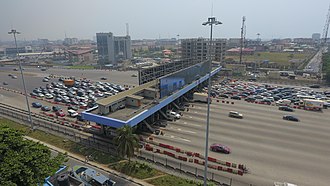Minds of the Movement
An ICNC blog on the people and power of civil resistance
by Amos OluwatoyeOctober 08, 2021
On October 3, 2020, a young man was allegedly shot in front of a hotel in Ughelli, Delta State, Nigeria by a police officer working with the Special Anti-Robbery Squad (SARS), a division of the Nigerian Police Force. The incident served as a watershed event for popularizing the Twitter campaign #EndSARS, which had begun in 2017. A young man, Miracle Ifeanyichukwu Okpara was arrested, detained and tortured by SARS on a false charge for haven stolen a laptop in March 2017. It was one of the several human rights violations perpetrated by some members of the police squad which started the EndSARS campaign the same year.
Protesters mobilized in Ughelli last October where the young man was said to have been murdered. The mobilization quickly spread to other states in the country as thousands of Nigerians watched the video of the innocent man said to have been killed. Eventually, young Nigerians in 25 of the country’s 36 states united and engaged in nonviolent demonstrations against police extortion and brutality. By October 7, 2020, ordinary Nigerians were joining the protest daily in a call for justice and peace. The movement featured mass mobilization of peaceful protesters—until agents provocateurs intruded, providing the government with false grounds to claim legal use of force against the protesters.
Who are agents provocateurs?
Agents provocateurs are people who are hired (paid) by the government, a group of political elites or others who oppose a civil resistance movement. They pretend to be movement supporters, but they engage in violence and try to disrupt the movement by inducing others to engage in violence. The term agent provocateur translates from French as “inciting agent.” They intend to make a nonviolent movement lose its credibility in the eyes of local and global sympathizers.
Because the violence they stir up gives the government reason to repress protesters, and may cause others to hesitate in supporting the movement, agents provocateurs often succeed at undercutting people power.
Agents provocateurs triggered government repression during the EndSARS movement

Lekki toll gate in Nigeria, the site of a police massacre of at least 10 protesters. Source: Wikipedia/S.aderogba (CC-BY-SA-4.0, unedited).
Agents provocateurs emerged during the EndSARS movement in Abuja, Lagos, Benin and some other states where protests were going on. The protest at the Lekki toll gate in Lagos in October 2020 was highly organized and peaceful; thousands of young Nigerians picketed at the toll gate to cut off traffic to businesses in the area in a bid to attract government attention to end SARS operations. On October 20, at about 6:50 pm, soldiers started shooting at unarmed protesters who were camping at Lekki tollgate.
The Lekki shooting led to the massacre of at least 10 protesters, and images of this incident went viral on various social media platforms. Violent protesters responded by killing police officers and destroying properties in Abuja, Lagos and other states during the protest. Hoodlums also stormed the correctional center in Benin and freed several criminals, and then they started looting and vandalizing stores of business owners, many of whom were initial sympathizers of the movement.
The situation soon began resembling a state of anarchy and the EndSARS movement began losing sympathizers. The activities of hoodlums, suspected to have been planted agents provocateurs, painted the initial leaders of the nonviolent movement as instigators of violence and chaos. The government took advantage of these violent activities to launch further violent attacks against protesters.
These and other similar examples from the #EndSARS movement show the importance of maintaining nonviolent discipline. For ordinary people in Nigeria to achieve their political goals through nonviolent action, their knowledge gap on this matter must be closed. Policies that promote nonviolent discipline should be communicated publicly. Leaders and activists should have a plan for how to identify agents provocateurs. Consistently maintaining nonviolent discipline can simultaneously help to defend against the actions of these provocateurs, reduce government repression of activists, and make any repression more likely to backfire against the government itself.

Amos Oluwatoye
Amos Oluwatoye is a Research Assistant with the Resistance Studies Initiative, the University of Massachusetts Amherst, conducting research on repression under the guidance of Prof. Stellan Vinthagen. He also serves as the Regional Research Lead for Sub-Saharan Africa in the Demo.Reset 2 Project and is pursuing an MSc in Peace and Security Studies at the University of Port Harcourt, Nigeria.
Read More